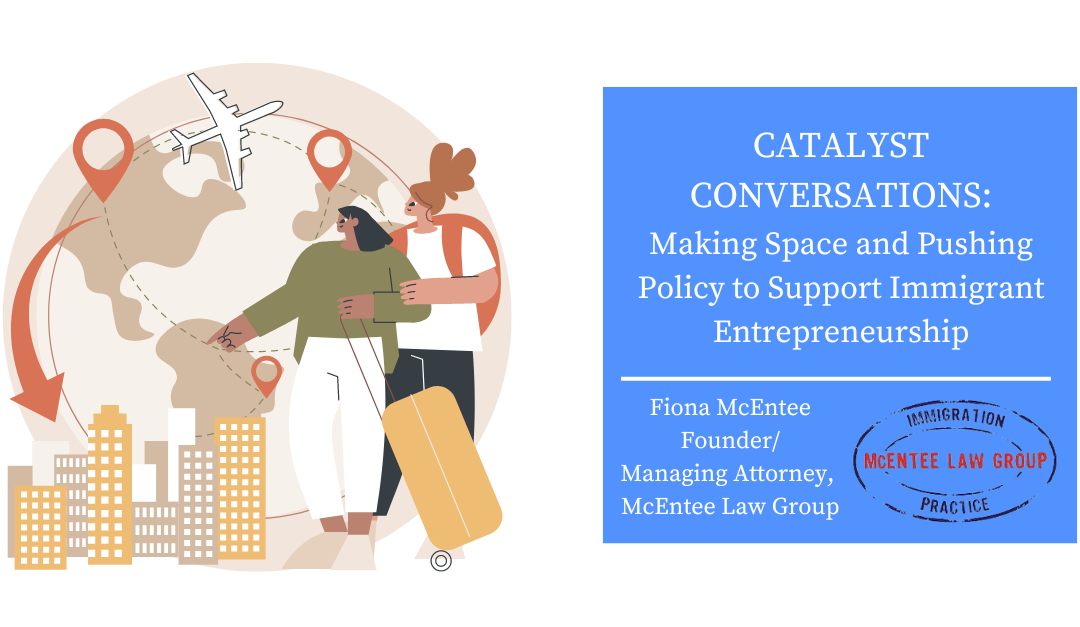CATALYST CONVERSATIONS: Making Space and Pushing Policy to Support Immigrant Entrepreneurship
Entrepreneurship and business creation is fundamental to a healthy economy. Immigrants in particular play an important role in creating jobs as they are more likely to start a new business than the rest of the population. Despite this, the United States lacks a startup visa to welcome immigrant entrepreneurs with a proven idea and solid investment. This results in many business owners struggling to stay—at a cost to our economy and its workers. The data shows that firms owned by immigrants provide millions of jobs for U.S. workers and generate billions of dollars in annual income. With new business formation slowing in the United States, immigrant entrepreneurs have a critical role in many parts of the country, creating jobs for all Americans.
Fiona McEntee is the Founding & Managing Attorney of McEntee Law Group. Fiona first moved to Chicago from Dublin, Ireland, back in 2002, as an international exchange student at DePaul University’s College of Law. Having fallen in love with Chicago, she returned to study at Chicago-Kent College of Law, where she received her Juris Doctor in 2007.
Fiona and her team of passionate advocates represent individuals and families, as well as the world’s leading musicians, artists, athletes, innovative entrepreneurs, and multinational and U.S. companies. They counsel their clients on the ever-changing immigration policies and help them achieve the American Dream.

Fiona McEntee, Founder/Managing Attorney, McEntee Law Group
How have immigrant and international entrepreneurs generally assisted in the American response against the Covid-19 Virus and pandemic more broadly?
We’ve consistently seen the impact that immigrants and immigrant entrepreneurs have had in the U.S., and this was never more apparent than during Covid-19.
The biggest illustration of this is the Covid-19 vaccination. We largely have immigrant entrepreneurs to thank for this! Pfizer, BioNTech, and Moderna were all founded or co-founded by immigrants.
Outside of the vaccination, I’ve seen how the entrepreneurial and innovative nature of immigrants has also played a factor in the pandemic. For example, Mert Iseri, is a long-time client of our firm (McEntee Law Group) and a Turkish immigrant who co-founded SwipeSense, a healthcare technology company that was ultimately acquired by SC Johnson in 2020.
SwipeSense started as a portable hand hygiene dispenser in 2011 and it evolved into a “comprehensive patient safety platform, providing visibility for everything from hand washing compliance to nurse rounding, from missing equipment to COVID contact tracing.” Mert’s leadership of SwipeSense has always been inspirational but especially so during the pandemic as we saw the company innovatively expand to other critical areas of safety in hospitals. I can say without question that America is better – and safer – for having immigrants like Mert here!
Do you think the Immigration policies enacted by the government of the United States during the pandemic set the innovation community back, regardless of the health merits associated with reducing travel?
Yes, I think we have been set back somewhat by the restrictive immigration policies (again regardless of the health merits) that were in place during the pandemic. There were many travel bans in effect and, in addition, the State Department closed Embassies and Consulates for a very long time and we’re still recovering from the backlogs.
I think it’s important to also point out that the pandemic started during the Trump Administration, so we were already dealing with extremely restrictive immigration policies in every area of immigration including business and startup immigration.
And while the Biden Administration is far from perfect, it’s very apparent that this Administration recognizes and appreciates the innovative nature of immigrants. The Administration has also made many important policy updates to support the fact that it “believes that one of America’s greatest strengths is our ability to attract global talent to strengthen our economy and technological competitiveness, and benefit working people and communities all across the country.” Some of these include policy updates done with a view to advancing “predictability and clarity for pathways for international STEM scholars, students, researchers, and experts to contribute to innovation and job creation efforts across America.”
Going forward, I think it’s critical that all Departments and Agencies (U.S. Citizenship & Immigration Services, State Department etc.) appreciate that our greatest strength truly is “our ability to attract global talent”. We must ensure that immigration cases are reviewed with this in mind, and that everything is done to ensure predictable and prompt processing of cases.
“I firmly believe that we need to do everything we can to ensure that these innovative immigrant entrepreneurs and international students can remain in the U.S. to continue working on their startup.”
ISTC was big supporters of the Entrepreneur Parole Rule, how can this program be improved upon since its inception in 2021?
ISTC has indeed been a big supporter of the International Entrepreneur Parole (IEP) program and we’re so thankful to have respected stakeholders like ISTC weigh-in on such important immigration options. You can read the OpEd I co-wrote with ISTC in Crain’s here that discussed IEP and the need for a startup visa.
IEP is great in theory and we’re so thankful to have it as an option, especially until we get a startup visa from Congress (and I’m optimistic that all our advocacy will pay off and we will get a startup visa from Congress at some point, hopefully in the near future.)
By way of history, the Biden Administration re-introduced IEP as an option for immigrant startup founders in May 2021, after the Trump administration effectively canceled the program before it even started up. Since its reintroduction, unfortunately IEP has not been utilized as much as it could have been largely due to the uncertain and very long processing times for these cases.
However, in March 2023, the USCIS announced that it had updated its policy manual to include a section on IEP. We are optimistic that these updates will bring some more certainty (and decreased processing times) for these cases so that IEP can be used by many immigrant startup founders and to the benefit of us all here, recalling that we are better – and safer – for having innovative immigrant entrepreneurs (like Mert) in the U.S.
We did a recent webinar on IEP and it’s available on our YouTube channel here.
Can you tell about the differences between the existing visas that are available through international treaties, and the ideal version of the startup visa? How are these programs similar, how are they different? Why is a startup visa our best option for promoting diverse, sustainable, small business growth in the US?
A global war for talent is underway and unfortunately, America is losing. Other countries are well-aware of these competitive sweepstakes and are modernizing their immigration pathways to attract the best and the brightest from around the world.
Unlike many of our international peers, U.S. immigration law does not have a visa category for modern-day startup founders who raise funds from angel investors or venture capitalists. As noted above, IEP is not a visa – it is an executive action that could be undone by subsequent administrations, as seen when the Trump administration shelved the program. Only Congress can create a new visa/law, and 1990 was the last time it truly revised our entire immigration system, making the immigration laws we have today over 30 years old.
America continues to be the top destination for international students as close to 1 million of them from more than 200 countries flock here for the world-class education, the ground-breaking research, and the multicultural environment. Closer to home, Illinois has the fifth-largest population of international students in the country. Additionally, ISTC’s recent report shows that these international students are very entrepreneurial — the percentage of university-supported startups in Illinois founded by at least one immigrant entrepreneur is around 42%.I firmly believe that we need to do everything we can to ensure that these innovative immigrant entrepreneurs and international students can remain in the U.S. to continue working on their startup. Congress passing a startup visa is a long overdue next step and I’m not going to stop advocating until we get a startup visa!
Finally, it’s important to note that while there may be some immigration options that work for some startup founders depending on specifics (like perhaps an O-1 visa, E-2 visa, H-1B visa, L-1A visa, and some more) none of these are modern immigration options crafted with the venture-funded startup in mind. I’ve written an eBook – U.S. Immigration Options for Startups: Accelerate Your American Dream – that provides some additional information on any and all options available to the immigrant founder and I hope it’s helpful to anyone trying to navigate this outdated and often complex system.

